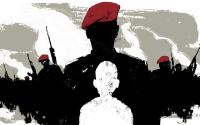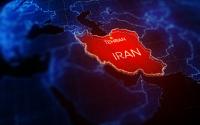15 November 2007Jeremy Scahill
Every day, new revelations emerge in the mounting scandal rocking the Bush Administration and the mercenary company Blackwater Worldwide. Much of the attention focuses on the now infamous shooting spree in Baghdad's Nisour Square on September 16, in which seventeen Iraqi civilians were killed and twenty-four wounded. FBI investigators are now alleging that fourteen were victims of unjustified and unprovoked shooting--some were shot while they were fleeing. Investigators also say they found nothing to substantiate Blackwater's claims of being fired on by Iraqis. This comes a month after a US Army investigation determined there was "no enemy activity involved" and labeled the shootings a "criminal event." But while Blackwater gets hammered in the press, the behind-the-scenes actions of the company's paymaster, the State Department, grow more scandalous by the minute.
Almost from the moment the Nisour Square shootings happened, the State Department has taken actions that give the impression of trying to cover up the incident. The department's initial report on the shooting was drafted by a Blackwater contractor on official US government stationery. The FBI was not dispatched to investigate the case until two weeks after the shootings, meaning that the initial investigation was in the hands of a non-law enforcement agency, the State Department, that just happens to be Blackwater's employer. In late October it emerged that the department had actually granted some Blackwater operatives "limited use immunity" in return for their statements on the shooting. Some Blackwater agents have reportedly refused to answer FBI questions, citing their State Department-granted "immunity." This means that their statements, and information gleaned from them, cannot be used to bring criminal charges against them. The State Department also offered to facilitate the payment of what amounted to hush money to victims of the shooting, which it has done on numerous occasions for Blackwater and other companies when they kill Iraqis.
Now this story has taken yet another dramatic twist. On Wednesday the State Department Inspector General, Howard "Cookie" Krongard, was in the hot seat on Capitol Hill, where he found himself being grilled by Representative Henry Waxman's Oversight and Government Affairs Committee. Krongard is the top State Department official charged with investigating allegations of waste, fraud and abuse. In addition to all of the questionable actions by the State Department in the Blackwater investigation, Krongard has faced charges that he impeded a Justice Department investigation into Blackwater over allegations the company was illegally smuggling weapons into Iraq. But the bombshell at the hearing was the revelation that Krongard's brother, Alvin "Buzzy" Krongard, recently accepted a position as a paid consultant for Blackwater, where he serves on the company's advisory board. Until his resignation in 2004, Buzzy was the number-three man at the Central Intelligence Agency (more on that later). Waxman's committee broke the news of Buzzy's Blackwater position as part of what can only be described as a masterful ambush of the Inspector General.
When Waxman revealed the conflict of interest with the brothers Krongard and Blackwater, alleging that Cookie Krongard had "concealed" his brother's relationship with Blackwater, the Inspector General told Waxman:
"I can tell you very frankly, I am not aware of any financial interest or position [my brother] has with respect to Blackwater. It couldn't possibly have affected anything I've done, because I don't believe it. And when these ugly rumors started recently, I specifically asked him. I do not believe it is true that he is a member of the advisory board, as you stated, and that is something I think I need to say."
This statement would quickly thrust Cookie Krongard, who was testifying under oath, in front of a firing line that would ultimately produce his recusal from the Blackwater investigation. Moments after Cookie Krongard denied that his brother had any involvement with Blackwater, the committee produced a letter from Blackwater CEO Erik Prince to Buzzy Krongard, dated July 26, inviting him to join the board and offering him a $3,500 honorarium per meeting attended plus all expenses paid. "Your experience and insight would be ideal to help our team determine where we are and where we are going," Prince wrote.
Cookie Krongard said his brother "has been involved in a lot of activities involving security. So it's no surprise that someone like Erik Prince would invite him to continue to support 'security, peace, and freedom.'" But Cookie Krongard insisted his brother had not accepted the position, saying, "I dispute that." Representative Elijah Cummings then produced a September 5 e-mail from Prince to Buzzy saying, "Welcome and thank you for accepting the invitation to be a member of the board." Cummings told Cookie, "Prince invited your brother to be at a board meeting to discuss strategic planning. And this meeting is taking place right now, in Williamsburg, Virginia, this week as we speak. Staff contacted the hotel to speak to your brother and the hotel confirmed that he was scheduled to be there."
Cookie replied that he was not aware of this, adding, "By the nature of my brother's work, you should understand that we have never discussed his work or my work, so I had no reason to even think that he had any involvement with Blackwater. But when these things surfaced, I called him and I asked him directly, he has told me he does not have any involvement, he does not have any financial interest. If you're telling me he does absolutely I would recuse myself" from the Blackwater investigation.
During a recess of the hearing, Cookie later said, he called his brother, who confirmed for him that he had indeed accepted a position on the Blackwater advisory board. Cookie abruptly announced he was recusing himself from all matters relating to Blackwater. But this is unlikely to be the end of Cookie's problems stemming from this scandal. He may actually have perjured himself. After the hearing, Buzzy Krongard told reporter Spencer Ackerman of TPM Muckraker that he had informed Cookie weeks ago of his position with Blackwater. "I had told my brother I was going on the advisory board," Buzzy said. "My brother says that is not the case. I stand by what I told my brother." When Ackerman asked Buzzy if Blackwater knew who his brother was when Prince offered him the advisory board position, Buzzy said, "You think I had to tell them? That they didn't know?" He added, "If [Cookie's] got integrity it's not gonna matter one way or other.... If he doesn't have integrity it's not gonna matter."
While Buzzy's new position on Blackwater's advisory board is indeed a salacious development, it is just the tip of the iceberg. In my book Blackwater: The Rise of the World's Most Powerful Mercenary Army, I explore in depth the relationship between Buzzy Krongard and Blackwater founder Erik Prince. The two men go back at least to 2002, when Buzzy helped jump-start Blackwater's ultra-profitable role as a provider of soldiers-for-hire in the "war on terror."
Though Blackwater was founded in 1997, Blackwater Security Consulting--its mercenary division--was incorporated in Delaware on January 22, 2002. Within months, as the United States occupied Afghanistan and began planning the Iraq invasion, Blackwater Security was already turning a profit, pulling in hundreds of thousands a month from a valuable CIA contract.
One of the players in forging that first Blackwater Security contract was Buzzy Krongard, at the time executive director of the CIA, the agency's number-three position. Krongard, who was named to that post in March 2001, had an unusual background for a spook, having spent most of his adult life as an investment banker. He had built up Alex.Brown, the country's oldest investment banking firm, into one of the most successful, and eventually sold it to Bankers Trust, from which he resigned in 1998. There have been some insinuations that Krongard was working undercover for the CIA years before he officially joined the agency in 1998 as a special adviser to George Tenet. But he won't reveal how he met the CIA director, except to say that it was through "mutual friends." The Princeton alum, Hall of Fame lacrosse player and former Marine boasts of having once punched a great white shark in the jaw; and he keeps one of its teeth on a chain and pictures of the animal in his office. Despite his bravado, some at the agency thought of Krongard as a wanna-be, according to a 2001 Newsweek story published shortly after his ascension to the number-three spot. "A wanna-be? Maybe I am. Maybe I'm not. That's as much as you're going to get," Krongard responded.
While working under Tenet at the CIA, Krongard acted internally, reorganizing divisions and pushing for projects like an intelligence venture capital firm, but he did on occasion speak publicly. In October 2001, he declared, "The war will be won in large measure by forces you do not know about, in actions you will not see and in ways you may not want to know about, but we will prevail."
Some three years later, in January 2005, Krongard made news when he became the most senior Administration figure to articulate the benefits of having not killed or captured Osama bin Laden. "You can make the argument that we're better off with him [at large]," he said. "Because if something happens to bin Laden, you might find a lot of people vying for his position and demonstrating how macho they are by unleashing a stream of terror.... He's turning into more of a charismatic leader than a terrorist mastermind." Krongard also characterized bin Laden "not as a chief executive but more like a venture capitalist," saying, "Let's say you and I want to blow up Trafalgar Square. So we go to bin Laden. And he'll say, 'Well, here's some money and some passports and if you need weapons, see this guy.'"
It's not clear exactly what the original connection was between Prince and Krongard. Some have alleged that Krongard knew Prince's father. In a brief telephone interview conducted for my book, Krongard would only say he was "familiar" with Prince and Blackwater. A former Blackwater executive, however, asserted, "I know that Erik and Krongard were good buddies." Whatever Krongard's involvement, it was during his tenure at the CIA that Blackwater landed its first security contract, in April 2002. Krongard visited Kabul and said he realized the agency's new station there was sorely lacking security. Blackwater received a $5.4 million six-month no-bid contract to provide twenty security guards for the Kabul CIA station. Krongard said it was Blackwater's offering and not his connection to Prince that led to the company landing the contract, and that he talked to Prince about the contract but wasn't certain who called whom, that he was "not sure which came first, the chicken or the egg." He said that someone else was responsible for actually signing off on the CIA contract. "Blackwater got a contract because they were the first people that could get people on the ground," Krongard said in the interview. "We were under the gun, we did whatever it took when I came back from Kabul.... The only concern we had was getting the best security for our people. If we thought Martians could provide it, I guess we would have gone after them."
The relationship between Krongard and Prince apparently got chummier after the contract was signed. "Krongard came down and visited Blackwater, and I had to take his kids around and let them shoot on the firing range a number of times," said a former Blackwater executive in an interview for my book. "That was after the contract was signed, and he may have come down just to see the company that he had just hired." Prince apparently became consumed with the prospect of being involved with secretive operations in the "war on terror"--so much so that he personally deployed on the front lines. Prince joined Jamie Smith, a former CIA operative who originally headed up Blackwater Security Consulting, as part of the original twenty-man contingent Blackwater sent to fulfill its first CIA contract, which began in May 2002, according to Robert Young Pelton's book Licensed to Kill.
Since CIA and other intelligence and security contracts are "black" contracts, it's difficult to pin down exactly how much Blackwater began pulling in after that first Afghanistan contract, but Smith described it as a rapid period of growth for Blackwater. The company's work for the CIA and the military and Prince's political and military connections would provide Blackwater with important leverage in wooing what would become its largest confirmed client, the US State Department. "After that first contract went off, there was a lot of romancing with the State Department where they were just up the road, so we traveled up there a lot in Kabul and tried to sweet-talk them into letting us on board with them," Smith said in an interview. "Once the State Department came on and there was a contract there, that opened up some different doors. Once you get your foot in the door with a government outfit that has offices in countries all over the world, it's like--and this is probably a horrible analogy--but it's something maybe like the metastasis of a cancer. You know, once you get into the bloodstream you're going to be all over the body in just a couple of days, you know what I mean? So if you get in that pipeline, then everywhere that they've got a problem and an office, there's an opportunity."
A year later, Prince's mercenary operations would get the boost of a lifetime when Blackwater was handed a $27 million no-bid contract to serve as the elite bodyguards of the US occupation of Iraq. To date that arrangement has brought Blackwater about $1 billion in federal "security" contracts. Is it just a coincidence that one of the key players in securing Blackwater's role as the leading mercenary company of the Bush Administration has a brother whose job it was to oversee Blackwater? Or that the Inspector General stands accused of failing to do his duty and actually impeding federal investigations into the company's potentially criminal activities? Is there a connection between the Krongards and the State Department's systematic cover-up campaign for Blackwater? Unsurprisingly, Blackwater's spokesperson, Anne Tyrrell, said, "We do not see a conflict of interest." But these aren't questions for the company's PR people. These are questions that must be answered by the brothers Krongard under oath.






